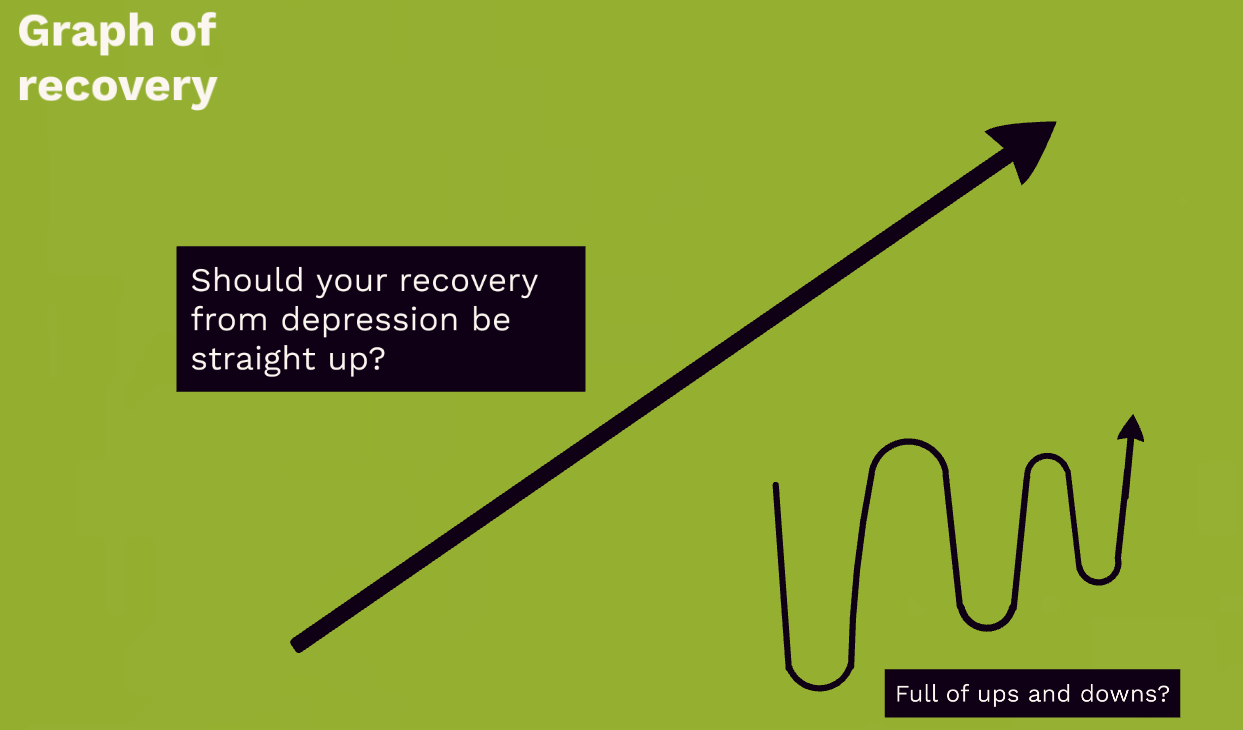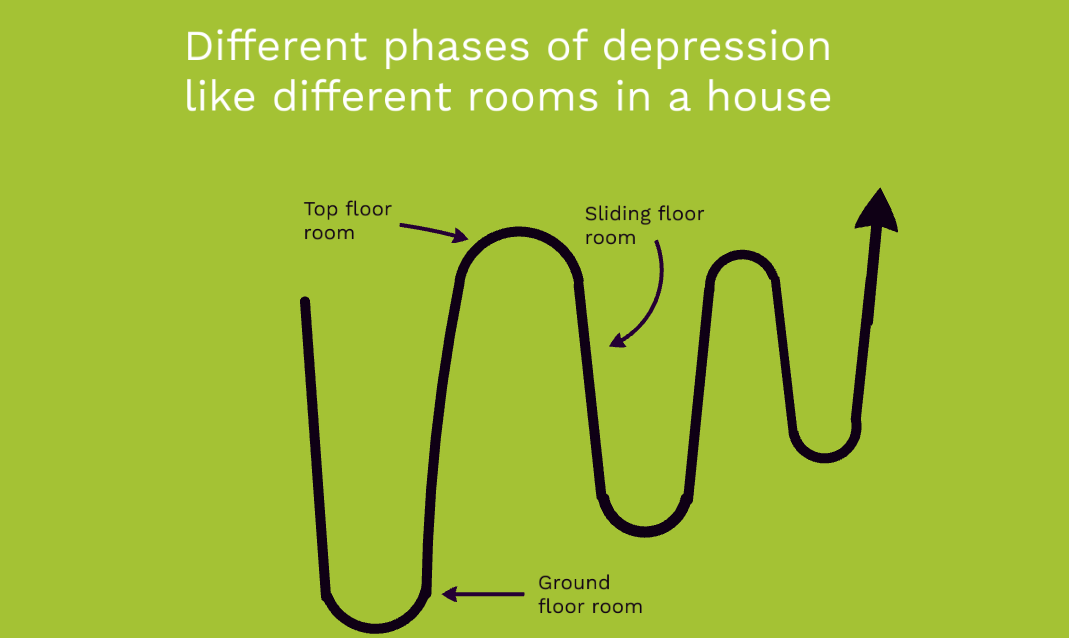When you mentally feel like crap and you know you should be feeling on top of the world

Do you beat yourself up for being depressed?
Maybe because your depression doesn’t feel related to any life event.
You’re in a fantastic relationship…
You are in a job you love…
And yet everything just feels so rubbishy.
Life feels sort of empty and nothing seems worth fighting for. You just feel incredibly low, with that murky feeling of worthlessness and hopelessness.
Maybe not wishing you were dead, but wishing there was a way out. Not wanting to wake up each day and have to fight so hard to feel so rubbish still.
So sadly, you beat yourself up for remaining in this unproductive place.
But then…
The tragedy is that none of this is your fault.
The fact is that no one gives you the tools you need to succeed with mental health.
And trying to break through and depressive lows without the correct tools is like the domestic cleaner who is trying to clean a dirty house like this…

With his bare hands.
With no equipment… No Hoover… No cleaning liquid or anything.
Honestly, it just won't work.
But the good news…
I am about to give you a fully loaded cupboard jam-packed with all the cleaning tools you need to do your cleaning.
In this article, I will reveal how to shorten your depressive lows to as little as one hour.
But even better, you will discover how you can avoid getting into those deep dark lows in the first place.
But first...
Do you expect the graph of recovery to go straight up like this?

Or do you think you should still be experiencing those ups and downs whilst you're getting better?
The truth is that recovery from depression will never be a straight line up. Instead, as you get better, you will still experience those ups and downs. The only difference is that they will not last so long or go so deep.
But why is this crucial to be aware of?
You see, if you don't know that this is a pattern recovery takes, every dip in mood you experience will feel like you're back at square one.
You will feel like you’ve failed again. And this conclusion alone can become so demoralising that it pushes you over the edge and keeps you down for longer.
So here is a much more helpful way to think about this. Because, ironically, the ups and downs of depression can feel strangely similar to battling with the house that never stays clean.
You see, when you clean a house, there are specific ways and specific things you need to do to clean it. For example, rooms with carpets need to be hoovered. Wooden floors need wiping and polishing. Each room requires a different set of tools.
So, to start managing depression better. You’ve got to treat the different phases of depression like different rooms in a house. With each phase requiring a different tactic and a different set of tools.

For example, when you're down in the dumps, in the low, low phase of depression, this requires one tactic.
Let’s call this phase the ground floor room.
Then when you are feeling better, or maybe just feeling okay. This requires a different approach entirely.
I like to call this feeling okay phase the top floor room.
And then when you are at the point where you are sliding down into a depressive funk. This also requires a different strategy.
I will call this phase, the sliding floor room.
Hope you can relate with everything you've read so far.
Now let's dig deeper…
I will start at the sliding floor room.

Again, this is the phase where you slide into that depressive funk. But why does this room exist in the first place?
You see, whilst there are so many causes for depression, according to the current evidence, the two threads that are common to all these different causes are...
Now, the nasty impact of stress can be massive even for someone who is not depressed.
Take, for example, Obama. Six years after he became president, see how old he grew.

My point here is that stress changes you.
In particular, the stress hormone cortisol penetrates into your cells, causing your cells to grow old faster, perform poorer and die faster.
So, what’s the implication of this for depression?
If this happens to you, it means you won't have enough functional cells in your body to carry around essential happy chemicals that you need to feel happy, functional and effective in life.
So your motivation is affected. Your energy levels take a hit. Your sense of enjoyment is completely destroyed. Negative thinking increases as your ability to have fun and do things you want diminishes.
Now, the biggest problem with this phase is that depression never announces its arrival.

It feels like you were well one day, and then suddenly out of the blue, you hit rock bottom.
In most cases, however, there is a gradual decline into depression. And there are many tell-tale signs. But because the decline is so gradual, you won't recognise the changes.
It’s like slowly boiling a frog. The frog doesn't feel the change in temperature until it’s too late to jump out of the boiling water.

Okay…
A quick disclaimer, I haven't boiled any frogs to determine if this is true. I just know of some native tribes who do this. In fact, I am vegetarian, so trust me, I don't eat any frogs.

Moving on…
What are the tools you need in this room for working against depression?
Well, in my experience the most important tool you can acquire in this room is the ability to recognise the first set of changes. The initial changes you experience as you begin to get depressed again.
So for example, perhaps you find yourself isolating more often, or you might worry a lot or become irritable or snappy.
The easiest way to determine this is to get the support of your friends and family members. People who know you well to help you identify what these initial changes are.
So, once you’ve got this information, whenever you see these early warning signs, step on your brakes and give your mind and body arrest.
Now, chances are that as you read the above statement, you had this niggling voice in your head saying…
Yes, this makes a lot of sense, but I just can't stop everything. I have got to work and pay the bills, so what you are asking me to do Adewale is not really realistic.
Yes, you’re right.
But there's one big secret to give your body the much-needed rest without having to put your whole life on hold. I'll be revealing this big secret in an upcoming article.
For now, though, you can start using this technique I call the tug of war strategy…
Want to know what this strategy is?
If you've played tug of war before, you might recognise this strategy.

In the tug-of-war game, a common approach for weakening your opponents is to release the rope ever so slightly and destabilise your opponent so they lose their grip and become unstable. This gives you the upper hand to pull them over the line.
This is exactly what we are trying to do with depression.
In other words, don't think of releasing the rope as a weakness. Don't think of things like taking a break, allowing yourself to rest, getting help and support as weaknesses.
Instead, think of them as you are setting yourself up for success over depression. This is how you release the valve of depression. This is where you take your energy back from depression. This is where you begin to win.
Side note:
Here are some other helpful tools you can use in the sliding floor phase of depression.
Progressive muscle relaxation.
Attention training.
Self care activities like healthy eating.
The top two tools above help to release pressure from the brain. All three tools used together consistently can stop the downward slide of depression.
Now let’s move on to the top floor room…

The top floor room is where you get back into dealing with life again because depression has lifted. So in this phase, you kick into survival mode because you're trying to prevent depression from attacking you again.

So, you make lifestyle changes... You do regular exercise... You work harder and criticize yourself to do better and you worry about the things that may jeopardize your carefully crafted plans to achieve your goals.
Essentially all the strategies, kick in and pile pressure on top of you. And then once the pressure has been heavy for a while, your mood starts to plummet.
Now, the biggest mistake in this room is that you will try to forget about your depressive episodes. You try to get on with your life. You try to claw back the time depression has stolen from you.
You try to blank out depression because you are feeling better now and you don't want to jeopardise this by thinking of all those sad thoughts. So, you push away any memory of your depressive episode to avoid making yourself unwell again.
But this is a big, big mistake…
Why?
Because trying to forget about your depressive episode like this makes you fail to equip yourself to manage depression better. So, when depression hits you again, you’ll have no clue of how to stop it from ruining your life all over again.
Now your most important tool for this room is too.
Stock up on your ammunition. You’ve got to get your grenade and your machine guns ready for battle.

I'll explain…
You see, most war camps have an ammunition room. A storage area that’s easily accessible and Jam-packed with explosives, guns and grenades.
This enables the soldiers to be ready to respond within seconds of an enemy attack.
You've got to build up your own ammunitions room to win your battles against depression too.
But how do you do this?
You do this by equipping yourself with the research and knowledge and skill on how to win.
The problem is that most people leave this research to when they are becoming depressed again. They leave the learning of crucial skills like mindfulness or negative thought management to times when their mind can't cope with the discipline of practice.
And sadly, this is the worst time. Because your brain is completely sabotaged by depression. So you won't be able to think clearly through anything you learn. And you won’t have any preventative coping skills to latch onto when depression strikes again.
This is like soldiers running into the ammunition room to find it empty.
The best time to understand depression is when you feel better. Because if you are feeling depressingly low, you cannot read long articles.
The best time is when you're feeling better because your brain is in its best position to think through things clearly, to remember things and make essential connections on how to deal with things when depression attacks again.
Side note:
Here are some other helpful tools you can use in the top floor phase of depression.
Journaling : Can be really powerful for dealing with life problems and for managing cognitive distortions. Journaling can also be a powerful tool for releasing mental pressure.
Balancing out your reliance on helpful / positive things: These positive things are often referred to as "maintenance behaviors in Cognitive Behavioral Therapy)
These two tools help to release pressure from the brain and can stop the downward slide.
Now we get to the hardest room of all.
The ground floor room.

The ground floor room is where your body feels like you’ve been punched by 10 professional boxers for days on end. You've lost your motivation, you feel emotionally numb, you have no interest and energy. And just making a cup of tea feel like climbing the highest mountain.
But what if I told you that these depressive symptoms you experience are actually key indicators that your brain is functioning perfectly? You’d probably think I’ve gone crazy right?
But according to Dr Karen Waiger Smith from the Research Institute, Rockefeller University…
Sometimes your depression is as a result of your body's attempt to repair itself.

Your brain realises that your healthy cells need to be replenished. So it goes into a frenzy of repair. And this frenzy of repair creates that familiar burnt out blah feeling of depression.
Now combine the impact of this blah feeling with the depletion of happy chemicals which I described earlier, and you’ve got two massive energy leeches sucking all the happiness out of you.
But here’s the important point…
The degree of energy and motivation sucking will depend on if you make this following mistake.
The biggest mistake you can make in the ground floor room is to work yourself hard with destructive thoughts... Trying to bully yourself out of depression.
If you do this, your internal pressure and stress will skyrocket and your negative thoughts will increase.
Fighting depression like this works against the brain's attempt to heal itself. And this will drop you into deep, dark and long depression.
This is the major reason why your lows take an eternity to climb out of.
So, your ultimate goal in the ground floor room is to give your brain the opportunity it needs to rest and heal itself. Antidepressant medication may help somewhat, but in my experience the fastest way rest your brain is by overindulging in calming and soothing activities.

As an example…
You can become a collector of compassionate phrases that counteract the negative phrases you beat yourself up with. If you often think thoughts like…
“Why can't I just cope with life?”
“Why can’t I accept that I'm ill?”
Or…
“I’m so selfish for thinking about killing myself”
Instead of thinking these thoughts, imagine you’ve got a friend who you love deeply. And she beating herself up badly for getting depressed in a similar way.
Would you say, “Yes! You should beat yourself up!”
No, you won’t do this.
You'll feel empathy for her. You'll feel sorry for her. And you wouldn’t feel ashamed for feeling sorry either. You’ll want to pull her towards you and give her a warm hug.
And you'll say I am here for you.
This is depression. This is not you.
Yes, you’ll feel groggy for some days and it will feel bad. But if you can treat yourself nicely. You’ll most likely come out of this depressing place faster.
So, here’s the deal…
You've got to speak to yourself about your depression like this. And doing so will help your brain rewire itself in positive ways.
And the good news, as the self-compassion does it's work, you'll notice that your motivation to do physical activity will gradually increase.
Side note:
Regular use of omega-3 fatty acids can also play an essential role in pulling out you out of the deep lows (Please seek medical advice before using this).
Yes, it's true. Depression can feel like a tsunami.

It grabs your life from you. Flattens you emotionally, and leaves you scrambling to escape that dark hole, making you want to opt out on life.
But when you understand what's going on, and you realise that it's a big mistake to focus all your energy only on the low, low phase of depression.
Because depression attacks you on three different levels. You’ve got to know what protective measures to apply for each of the phases depression takes you through.
This is how you can snap out of the depressive blows faster. This is how you can shorten your depressive lows to as little as 1 hour. This is how you snatch the power back from depression.
So…
Remember to stock up on your ammunition when you hit the top floor room. This way, you are better equipped for the next time depression hits again.
Get to know depression inside-out so that as soon as you spot depression sneaking back, you can swot it away like a fly and snap yourself out of depression before it has time to take hold of you.
When you hit the ground floor room, remember that…
You struggling to get out of bed, feeling exhausted by every little thing is your brain trying to repair itself.
And remember that this is the points to overindulge in bucket loads of self-compassion. Make it a compulsory part of your daily routine. Nurture yourself with warm and self-soothing thoughts that breathe positive emotions.
Yes! It’s still going to be massively hard…
But as you practice these skills. In time, you will get better at it.
Until one day…
You’ll suddenly notice that your deep dark and long days of feeling depressed and no longer happening.
Yes, you’ll still get depressed occasionally…
But your depression has now become a minute powerless puddle of water that you can stamp out with just one foot.

CLOSE X
Enter your details then hit
"Let me know when it's out"
And you'll be notified as soon as the video series is released.
We won't send you spam. Unsubscribe at any time.
CLOSE X
Cognitive healing is a natural process that allows your brain to heal and repair itself, leading to improved self-esteem, self-confidence, happiness, and a higher quality of life.
Click GRAB IT to enter your email address to receive the free mini e-book: Cognitive Healing. You'll be caught red handed.
GRAB ITWe won't send you spam. Unsubscribe at any time.